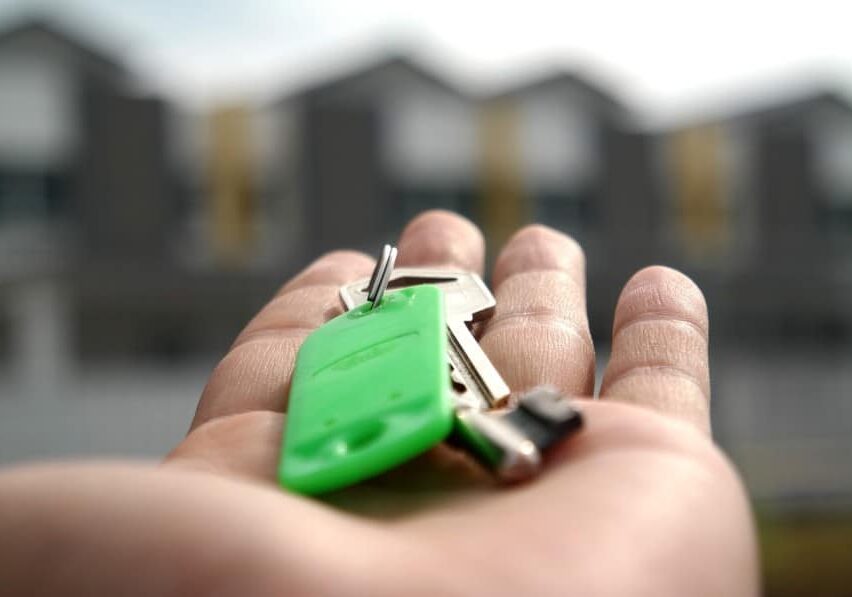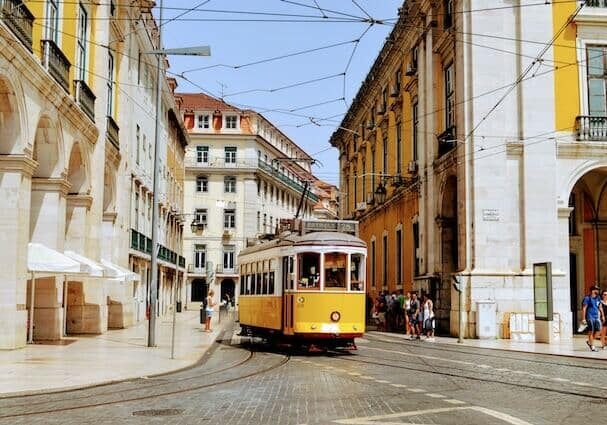Updated: April 23, 2024
Conveniently situated near a breathtaking string of Atlantic beaches stretching from Cascais to Estoril, Lisbon – Portugal’s largest city and capital – offers a lifestyle that caters to diverse tastes.
Buying property in Lisbon, Portugal, would be an excellent financial investment and lifestyle choice as this cosmopolitan hub is a major tourist destination, attracting young professionals, digital nomads, and expat retirees from other European countries and across the globe.
From the cultural heart of Baixa with its rich history to the elegance of Chiado and the vibrant nightlife of Bairro Alto, Lisbon is one of the most sought-after European cities. Lisbon features an unmatched selection of historic neighborhoods with unique charm and attractions and offers a welcoming community living in a safe and inclusive environment.
Purchasing foreign real estate and navigating Lisbon’s real estate market involves several key steps, from drafting essential contracts and completing transactions to finalizing paperwork and property deeds.
In this article, we will guide you through the process of buying property in Lisbon and give you insights into the real estate market and property investment in Lisbon. We will also highlight the importance of securing a legal expert and international property professionals to help you manage the complex processes and successfully guide you to foreign property ownership.
Why buy property in Lisbon?
Buying property in Portugal has proved to be an excellent opportunity for expats and investors from across the world. Often depicted as the perfect holiday location, with a sublime climate, friendly locals, and beautiful beaches, Lisbon offers a unique blend of tradition and modernity, set in the historic stage of narrow streets, grand praças, and colorful houses. Whether you are looking for commercial properties, a second or third home, or a real estate investment that will offer significant rental yields, Lisbon offers a generous selection of apartments, villas, offices, and more options that are perfect for property investment. You will also find a wide price range, from high property prices to more affordable prices. If buying residential property, as you move away from central Lisbon and the city center, you will find that Lisbon property prices generally fall.
Key reasons to invest in the Lisbon real estate market

In September 2023, Portugal’s Foreigners and Borders Service (SEF) reported that the number of foreign nationals living in Portugal grew to about 980,000 and that most expats chose to relocate to Lisbon, Cascais, Sintra, Porto, and Braga. It’s important to note that in October 2023, the Agency for Integration, Migration and Asylum (AIMA) took over SEF’s responsibilities and duties.
Although the residence program has now ended, the attractive non-habitual residence scheme was a big draw card offering significant tax benefits to expats for ten years. The Portuguese government has welcomed international foreign investment and businesses to Portugal with open arms. This is without going into the city’s proximity to white sandy beaches and stunning coastal views you can enjoy once you find your dream property.
Lisbon has a different price bracket compared to the rest of the country. However, when compared to other Western European capitals, it remains very well priced considering property value, which makes buying Lisbon real estate a great investment.
Can foreigners buy property in Portugal?
There are no restrictions applied to foreign property ownership in Lisbon or Portugal. Buying property in Lisbon is also relatively easy to do if you have the support and assistance of real estate professionals guiding you every step of the way. The professional assistance of a local real estate agent or buyer’s agent is not a strict requirement. However, their services will prove invaluable in the long run.
Of course, if you are purchasing a property to visit for vacations or to live in permanently, you will need to secure one of the valid visa options Portugal offers. The visa options for non-EU citizens looking to become property owners include the Portugal D7 Visa (Retirement or Passive Income Visa), the Digital Nomad Visa, and the Portugal Golden Visa program.
Lisbon's Real Estate Market: An Overview

Due to the continued popularity of the capital city as a major tourist hub, alongside interest in foreign ownership, the average asking price for property in the city of Lisbon increased to €6,009 per square meter in 2023, while in the Greater Lisbon Area, the average asking price was €4,061. Note that this is the asking price, and the sales price can often be much less than this or, in some less frequent cases, higher. Also, it is worth bearing in mind that prices are generally higher the closer you are to the city center.
The Portuguese real estate market intelligence unit, Confidencial Imobiliário, reported significant increases in the percentage of gross rental yields on property in Lisbon in 2023. Rent prices are quite high at the moment in Lisbon, with rental yields in some key neighborhoods shown below.
- Alcântara: 5.4 percent
- Arroios: 5.5 percent
- Benfica: 5.2 percent
- Estrela: 5.4 percent
- Marvila: 6.6 percent
- Penha de França: 5.5 percent
Where to Buy Property in Lisbon

You also have the futuristic neighborhood of Parque das Nações, which is reminiscent of Canary Wharf in London. And, of course, Misericórdia offers beautiful, elegant luxury, with Avenida da Liberdade, Príncipe Real, and parts of Chiado each offering their own unique ambiance. Real estate investment in Cascais is also very desirable and is located just a 30-minute drive from Lisbon city center. You may also want to consider a more affordable residential neighborhood in Lisbon, such as Lisbon South Bay, where, if you choose to enter the short-term rental market, you can make rental income from your property acquisition.
How to find property in Lisbon, Portugal
A good place to start is with online research, which will give you insight into the types of property available for rent or purchase and an idea of the price of property in the city. Seeking the professional assistance of a real estate agent or a buyer’s agent will make your property search a much easier process with the benefit of their expertise and local knowledge.
A buyer’s agent, such as Goldcrest, will usually have access to properties for sale that cannot be found elsewhere. Buyer’s Agents can also sometimes find Lisbon property at a slightly cheaper price.
The key difference between real estate agents in Portugal and buyer’s agents is that real estate agents work on behalf of the seller and can get a higher commission for a higher sale. Meanwhile, a buyer’s agent solely works on behalf of the buyer, presenting no conflict of interest and improving your chances of finding the perfect property at the best possible price.
A Step-by-Step Guide to Buying Property in Lisbon, Portugal
The process of purchasing property in Lisbon, Portugal, is not as difficult as you may think. Many foreigners buy property in Lisbon and have even been able to do so with a Portuguese mortgage and the help of an experienced lawyer, an estate agent, and a trusted financial advisor.
In the comprehensive table below, we have created a concise step-by-step guide for foreigners looking to buy property in Lisbon, which outlines the purchase process, and legal requirements, and everything you need to know about finding the perfect property in Lisbon to make an offer and seal the deal.
Step | Description |
Step 1: Secure financing for your property | Assess your finances, explore mortgage options from Portuguese banks, and understand associated costs such as taxes, legal fees, and property registration expenses. |
Step 2: Find the perfect property | Set a budget and research the Portuguese real estate market, focusing on location, amenities, and rental potential. Seek guidance from real estate professionals like buyer's agents or real estate agents. |
Step 3: Make an offer | Once you find a suitable property, negotiate an offer with the seller, potentially facilitated by a real estate professional. Consider having a buyer's agent representing your best interests during negotiations. |
Step 4: Reservation Agreement and CPCV | After an offer is accepted, a Reservation Agreement may require a refundable fee. The Promissory Contract (CPCV) finalizes the deal, often with a 10 percent deposit, signed in front of a Notary. |
Step 5: Signing the Escritura | The Escritura, or Final Deed, officially transfers property ownership. Signed before a Notary, it involves paying remaining balances and fees. After signing, the buyer becomes the official owner, concluding the process. |
Requirements for a Successful Property Purchase
An essential part of the process when buying property in Lisbon and Portugal is applying for a Portuguese NIF number and opening a bank account. You will need an NIF to make any significant financial transactions in the country, whether you are considering investing in the Lisbon residential real estate market or acquiring a commercial property. Our partner, Global Citizen Solutions, offers a comprehensive guide about how to get a tax identification number (NIF) in Portugal.
Portuguese tax number
You will need a NIF, the Portuguese tax number, to open a bank account in Portugal. You can apply for a NIF number yourself at your local tax office or get an attorney to assist you. If you are a non-EU citizen, you will need to have a fiscal representative. To avoid having to go to the local tax office, you can also apply for your NIF number online.
Portuguese bank account
When buying property in Lisbon, it is recommended to open a Portuguese bank account to avoid transaction fees when making your purchase. There are a variety of Portuguese banks to consider, many of which offer mortgages for foreign buyers.
Required Documents to Buy Property in Lisbon

To buy property in Lisbon, you will need the following documents:
- Photo ID: A valid identification document that verifies your identity.
- Contrato Promessa de Compra e Venda (CPCV): The buying contract or property deed that outlines the terms and conditions of the property purchase.
- Energy Certificate: The property’s energy certificate is a document that provides information about the energy efficiency of the property and must be presented to you by the seller. Read our guide, Portugal’s Energy Performance Certificate Explained, to learn more.
- Imposto de Selo: The stamp duty payment, which is a tax required by the Tax Authority for property transactions.
- Caderneta Predial: The land register document that contains information about the property, including its location, boundaries, and registered owner.
How to Buy Property in Lisbon: Financing Your New Home
It is important to understand if you will need a mortgage and, if so, what the mortgage options are in Portugal.
The maximum one can borrow depends on the loan-to-value.
For residents with a fiscal number, the maximum one can borrow is 90 percent for a permanent home (80 percent for a second home).
For non-residents, the maximum loan-to-value mortgage ratio is 70-75 percent.
Get your budget straight
After thoroughly researching property prices, it is important to create a clear budget that takes the additional property costs, from initial application fees to property taxes. If you need to finance your purchase, also bear in mind that for Portuguese residents, mortgage deposits usually range between 10 percent and 20 percent, while non-residents typically require around 30 percent of the property value as a deposit.
Financing your property: The main options
If you have the capital, you can purchase a property in Lisbon with a once-off payment. However, there is also a great selection of mortgage options available from financial service providers, including BBVA, Santander, Banco Best, Bankinter, and Banco CTT.
Types of mortgages
There are over 15 banks in Portugal that provide various mortgage options, although all comply with the Bank of Portugal’s standardized regulations. There are two main types of mortgages, namely the fixed-rate mortgage and the variable-rate mortgage.
Fixed-rate mortgages
You will pay a constant rate over a set period, protecting you against fluctuation changes. This is agreed with the financial institution when requesting financing for your property. It can be fixed for the entire lifespan or, more commonly, for a certain time before reverting to a variable-rate mortgage. A 2 percent fine will need to be paid if there is early repayment on your part.
Variable-rate mortgages
Your monthly payment fluctuations depend on an index (usually Euribor). Payments are revised on a six or 12-month basis. Early repayments pay a fee of 0.5 percent. For a full overview of the mortgage process, in addition to the most desirable areas, practicalities of moving to Portugal, and a whole host of topics vital to moving and buying a house in Portugal, our book, Your Expert Guide to Buying Property in Portugal, will provide you all the information that you will need.
Exploring Taxes and Fees when Buying Property in Lisbon
Expats pay taxes when purchasing property in Portugal, so you will need to anticipate paying fees and the other property costs involved besides the standard property prices, which include legal fees, agency fees, property taxes, and possibly capital gains tax if you ever decide to sell the property. These additional real estate acquisition costs will either need to be paid at the time of purchase or on an annual basis following the purchase.
At the time of purchase
Property purchase tax (IMT)
The (IMT) Imposto Municipal Sobre as Transmissões Onerosas de Imóveis (Municipal Tax on Onerous Transmissions of Real Estate) is a property transfer tax paid when purchasing Portuguese property. The tax must be paid before completing the purchase, and the rate ranges from 0 to 10 percent. The amount varies depending on the purchase price, the type of property (i.e., rural/urban), the location (continental Portugal, autonomous region), and whether the property is to be the primary or secondary home.
Stamp duty
Imposto do Selo (Stamp Tax) is an additional transaction tax that may need to be paid. Real estate transactions are usually subject to a rate of 0.8 percent.
Taxes after the property purchase
Municipal Property Tax (IMI)
The (IMI) Imposto Municipal sobre Imóveis (Municipal Property Tax or Immovable Property Tax) is an annual tax established annually by the municipality and is determined by the area that your property is located in. The amount is usually between 0.3 and 0.5 percent for urban properties and 0.8 percent for rural properties. Note that the IMI is levied on the tax value of the property and not on the price paid for the property.
Wealth Tax (AIMI)
There is a Portuguese Wealth Tax (AIMI) on properties that cost more than €600,000. This will range from 0.7 to 1.5 percent, depending on the price.
For information on Capital Gains Tax, you can consult our article: Capital Gains Tax Portugal: Your Definitive Guide
The Costs of Buying Property in Lisbon
When preparing to purchase property in Lisbon, Portugal, it’s crucial to factor in the various one-off costs essential for the transaction. These include notary and registration fees, attorney fees, transfer tax (IMT), stamp duty fees, and potential expenses related to the land registry. Additionally, there might be fees associated with lawyers, especially if legal counsel is sought during the property buying process.
Is it worth buying property in Lisbon?
There are many good reasons to invest in the Lisbon property market. Some of these key advantages include:
- No restrictions on foreign property investment
- Investing in a dynamic market with a high return on investment potential
- Low cost of living compared with other countries in Western Europe
- Sublime climate with incredible summers and mild winters
- Top-quality education and healthcare services
Consider these benefits and consider potential pitfalls you may encounter during the process. These potential pitfalls could include legal complexities with property title deeds or debts attached to the property that could lead to lengthy legal battles. Seeking the professional services of a buyer’s agent or experienced local real estate agent will help you understand the intricacies of property purchases in Portugal’s capital city, navigate setbacks, and save you from potential issues.
Goldcrest: We Can Help You Find Your Dream Property
Goldcrest is a buyer’s agent that is based in Lisbon, Porto, and the Algarve. Equipped with local knowledge, exclusive networks, and international experience, we provide expert, impartial advice on property investments and how to buy property in Lisbon, Portugal. From scouting out the perfect property through to property acquisition, we have you covered throughout the process. Our team of skilled experts is available to cater to all your real estate needs, offering insightful expertise and strategic advice. Book a complimentary call with us today.
Frequently Asked Questions about Buying a House in Lisbon Portugal
Are there any restrictions to buying a house in Lisbon as a foreigner?
There are no restrictions to buying a house in Portugal as a foreigner. However, if you are a non-EU citizen, you will need to have a valid residency permit to live in Portugal.
Where are the best neighborhoods to buy a house in Lisbon, Portugal?
If you are looking for luxury homes when buying real estate in Lisbon, consider Avenida da Liberdade, Príncipe Real, and Baixa Chiado. Estela is good for families, Arroios is the hip neighborhood, and Parque das Nações offers a contemporary and futuristic vibe. Cascais real estate is also an attractive option to find a beautiful house with sea views.
Do I need a lawyer when buying a house in Lisbon?
Although professional assistance is not strictly required to buy property in Lisbon, acquiring the services of an experienced real estate lawyer and English-speaking real estate agent or a buyer’s agent who has vital knowledge about Lisbon real estate, property in Portugal, and real estate market legalities is recommended.
What are the additional fees when buying a property in Lisbon?
Besides, the property’s asking price costs are essential to factor in, which include notary and registration fees, attorney fees, transfer tax (IMT), stamp duty fees, and potential expenses related to the land registry.
How much do I need for a deposit payment?
The deposit for Lisbon property usually lies between 10 to 25 percent of the purchase price, although this can be lower if both the seller and buyer agree.
Is property in Lisbon expensive?
Property in Portugal’s cosmopolitan capital city is highly sought-after and, therefore, more expensive than other regions of this stunning Western European country. In 2023, the average price for property in Lisbon City was €6,009 per square meter. Note that this is the average asking price and the sales price can be significantly lower than this. You will find property cheaper in the greater Lisbon Metropolitan area, with average asking prices standing at €4,061 per square meter. Note that these are asking prices, and sales prices can be significantly lower than this – or higher in certain situations, although this is less common.
Is property cheap in Lisbon?
In 2023, the average price of an apartment in Lisbon City was €6,009 per square meter, while in the Metropolitan Area, prices stood at €4,061 per square meter. Property prices in Portugal vary according to the neighborhood you are looking to invest in and whether you are in search of a residential or commercial property. You will find cheap property more readily available as you move away from central Lisbon.
What is the average price of a property in Lisbon?
Yes, Lisbon is an attractive expat and tourist destination and offers visitors and residents alike a high quality of life. This fosters a great environment for potential returns on investment, whether you are in search of a property in Portugal for residence or investment.
Where do most expats live in Lisbon?
The best neighborhoods in Lisbon for expats include Alcântara and Anjos, which are modern areas that attract digital nomads and young professionals. Areas like Alfama and Graça offer authentic Portuguese charm and living experiences, while areas such as Estrela and Lapa are popular choices for families.
Where can I find Lisbon real estate beachfront properties?
Start looking for beachfront properties online by visiting online listing websites and real estate agencies. Once you have an idea of what you are looking for and the location you are looking in, you can contact a real estate agent or buyer’s agent for assistance with the process.
A buyer’s agent like Goldcrest will also be of great value as they will have access to exclusive listings through their network and solely work on your behalf as the buyer.
What are the pitfalls of buying property in Lisbon?
There are several potential pitfalls you could encounter when buying property in Lisbon, which is why seeking the professional services of a buyer’s agent is highly recommended. Potential issues may include legal complexities with property title deeds or debts attached to the property, overlooking local regulations or tax laws, and unforeseen issues related to location.
Is now a good time to buy property in Lisbon?
While housing prices are higher, 2024 is a great year for foreign investors to invest in family properties or luxury properties in Lisbon, Portugal. This is due to the significant growth of rental income yields over the past few years. Rental income yields in the Lisbon Metropolitan Area stood at 6.7 percent in 2023. You will find that residential and commercial properties remain a solid investment in Lisbon, where you can get a nice return on your investment. Should you be looking for affordable prices, you will find prices fall considerably as you move further away from the city center.
What is IMT tax?
Calculated based on the property’s purchase price value or declared amount in the deed, the IMT (Municipal Tax on Onerous Transmissions of Real Estate) is a property transfer tax that needs to be paid before the purchase is completed. The rate varies from 0 to 8 percent based on factors like property type, location, purchase price, and intended use.
Can foreigners buy property in Lisbon?
Yes, foreigners buying property in Lisbon will face no restrictions.
Is it worth buying property in Lisbon?
Lisbon offers excellent investment potential with rising property values, a booming tourism industry, and a vibrant lifestyle, making it a lucrative choice for buyers seeking both short-term gains and long-term appreciation. Families and retirees will also find the Portugeuse capital a charming destination to relocate to, while young professionals are also relocating to the city given its affordability, booming tech scene, incredible climate, and old-age charm.
Is Lisbon property overpriced?
While Lisbon’s property market has seen significant appreciation, with property prices rising drastically in recent years, it remains attractive compared to other European capitals. Property prices reflect the city’s growing popularity, but careful research and speaking with real estate experts can still uncover good value investment opportunities.
Is buying property in Lisbon a good investment?
Lisbon is emerging as a sought-after destination for property investors, with expectations of a 1.3 percent year-on-year GDP growth in 2024, followed by a projected 1.8 percent in 2025. Additionally, employment is on a steady rise, attributed in part to an influx of foreign workers. Wages have outpaced inflation, contributing to the city’s economic vibrancy.



